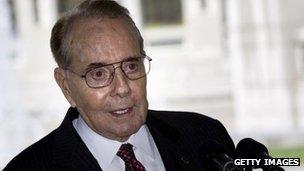US Senate rejects UN disability rights treaty
- Published

Bob Dole, who was disabled in World War II, has been a long-time advocate of the UN treaty
A UN treaty on disability rights has been rejected by the US Senate.
The 61-38 vote on the Convention on the Rights of Persons with Disabilities, external meant the treaty failed to reach the two-thirds majority needed.
Disabled former senator and Republican presidential candidate Bob Dole, who uses a wheelchair, appeared on the floor of the Senate in support.
The treaty was signed by 155 nations and ratified by 126, including Britain, France, Germany, China and Russia.
It says all nations should work to ensure that disabled people enjoy the same rights and freedoms as other citizens.
The treaty was backed by Mr Dole, who was disabled in World War II, Arizona Senator John McCain, who sustained disabling injuries in the Vietnam War, Indiana Senator Richard Lugar, the top Republican on the Foreign Relations Committee, and former Attorney General Dick Thornburgh.
However, only eight Republican senators voted in favour of the treaty.
Others, like Oklahoma Senator Jim Inhofe, said they voted against the measure because of the extra regulation it would bring with it.
"I do not support the cumbersome regulations and potentially overzealous international organisations with anti-American biases that infringe upon American society," Mr Inhofe said.
The White House said it was "disappointed" that the "overwhelming majority" of Senate Republicans voted against the treaty.
Ratification of the treaty "would position the United States to support extending across the globe the rights that Americans already enjoy at home. This in turn would improve the lives of Americans with disabilities" who choose to live or travel abroad, the White House added.
Massachusetts Democratic Senator John Kerry, who backed the treaty, said: "It really isn't controversial.
"What this treaty says is very simple. It just says that you can't discriminate against the disabled."
Supporters also said ratification of the treaty would not require any changes to US law.
The 1990 Americans with Disabilities Act, which sought to protect equal rights for the disabled, became the basis of the UN treaty.
It was negotiated under former President George W Bush's administration and signed by President Barack Obama in 2009.
About 10% of the world's population - or 650 million people - are disabled, UN estimates suggest.
- Published17 January 2012
- Published22 October 2011